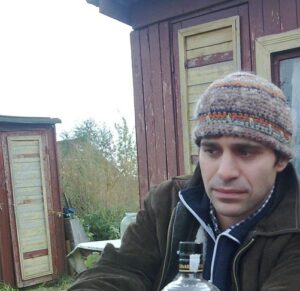 It wasn’t inevitable, until Western policy mistakes made it so, but like a train moving down the tracks it had a lot of inertia and wasn’t going to stop on a dime. It was a long time coming.
It wasn’t inevitable, until Western policy mistakes made it so, but like a train moving down the tracks it had a lot of inertia and wasn’t going to stop on a dime. It was a long time coming.
This conclusion is based on a piece in the Guardian (read it here) by Keith Gessen (pictured here in modern Russian accommodations with Russia’s principal mode of sustenance), a Russian-born and Harvard-educated American journalist (bio here) who often writes on Russia-related topics.
It’s a long article, by news media standards, and has to be because it covers 30 years of history. The Ukraine war is rooted deep in history.
Gessen breaks that history into five parts, starting with (1) the breakup of the Soviet Union (which made Ukraine independent), followed by (2) Ukraine’s post-independence politics (Zelensky was very unpopular until 3 weeks ago), (3) Russia’s anti-NATO obsession (“in Russia, Nato is a four-letter word”), (4) Putin’s thought process (a typical Russian politician of the post-Soviet era), and finally (5) the question of where this ends (“impossible to say”).
For at least 20 years, Putin like other Russian leaders has grown increasingly disturbed by eastern Europe’s drift to the West, and alarmed by NATO’s rapid expansion. On top of that, he wants a Ukrainian government that’s deferential to Russian interests. He may have been expecting a walkover, but in any case, he underestimated the sentiments of the Ukrainian people, who don’t want to be bullied by Moscow. The world, not least Putin himself, has been surprised by the ferocity of Ukrainian resistance. (Less surprising is the Russian invading army’s lackluster performance in battle, given Russia’s reputation as a nation of drunks; see articles here and here.)
It’s all very complicated, which is why I can’t readily summarize it. Gessen, I think, does a good job of untangling it, which is why you should read his article in its entirety in order to understand why this happened. My take: It wasn’t inevitable in the 1990s or early 2000s, but the roots of this conflict run deep in Russian and Ukrainian psyches and histories, and nothing would’ve prevented it short of a Moscow-subservient regime in Kyiv, which Ukraine’s recent history made impossible. Such a regime was overthrown in 2014, and that’s when an attempt by Putin and the Russian military to seize Ukraine by force probably became inevitable.
As for why Putin didn’t move against Ukraine while Trump was president, an article in Politico (read it here) answers by saying, “With Trump in office, Putin was already getting what he wanted,” pointing out that “Trump worked to diminish the influence of NATO, reportedly planning to withdraw from it in his second term … broke with longstanding bipartisan support of Ukraine … withheld military aid to Ukraine, … [and his] policy alignment with Putin advanced the aims of Russia’s political elites.”
Does that mean we should blame the war on Biden, because he shifted Washington D.C.’s policy away from coddling Putin? No, we should blame Putin; he, not Biden, fired the missiles and set the tanks rolling. Trump has tried to portray himself as a peacemaker, but he was making Neville Chamberlain’s kind of peace.
It’s pretty certain Putin had his eye on the rest of eastern Europe, too, and handing him Ukraine without a fight (if that was possible, and it probably wasn’t, with the Ukrainian people in the way) would have shown weakness, whetted his appetite for more, and enabled him to conserve his military resources for a campaign against a weakened and abandoned NATO. Trump sought the kind of peace that involves surrendering to the block bully.
What reason is there to believe the European NATO countries would have gone along? As Geffen remind us, in 1993 Polish officials said, “If you don’t let us into Nato, we’re getting nuclear weapons. We don’t trust the Russians.” And that was even before Putin became Russia’s dictator and began pursuing is vision of Making Russia Feared Again.